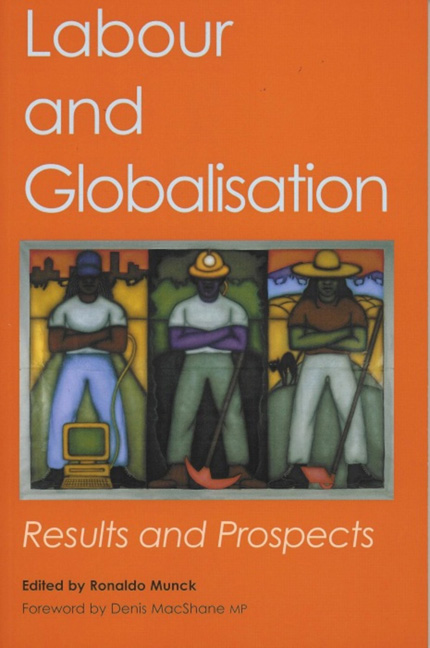Book contents
- Frontmatter
- Contents
- Acknowledgements
- Foreword
- Notes on the Contributors
- List of Abbreviations
- Introduction: Globalisation and Labour Transnationalism
- Part I Global Dimensions
- 1 An Emerging Agenda for Trade Unions?
- 2 The ICFTU and the World Economy: A Historical Perspective
- 3 Globalisation, Imperialism and the Labour Standards Debate
- 4 Towards Global Networked Unions
- Part II Spatial Dimensions
- Part III Social Dimensions
- Index
1 - An Emerging Agenda for Trade Unions?
from Part I - Global Dimensions
- Frontmatter
- Contents
- Acknowledgements
- Foreword
- Notes on the Contributors
- List of Abbreviations
- Introduction: Globalisation and Labour Transnationalism
- Part I Global Dimensions
- 1 An Emerging Agenda for Trade Unions?
- 2 The ICFTU and the World Economy: A Historical Perspective
- 3 Globalisation, Imperialism and the Labour Standards Debate
- 4 Towards Global Networked Unions
- Part II Spatial Dimensions
- Part III Social Dimensions
- Index
Summary
‘Trade unions have always had two faces, sword of justice and vested interest’ (Flanders, 1970: 15). The balance between these two features can change over time, however. It seems clear that in many countries, unions have lately come to be widely perceived as conservative institutions, primarily concerned to defend the relative advantages of a minority of the working population. One of the challenges which confront trade unionism in the twenty-first century is therefore to revive, and to redefine, the role as sword of justice.
Many union leaders and activists around the world are indeed well aware of this challenge, and in a variety of countries there are examples of creative and imaginative responses. The aim of this chapter is to review some of the challenges and discuss some of the potential for response. An important task for our project will be to survey the latter in more detail.
The battle of ideas
It is common to emphasise the material challenges faced by trade unions, and with good reason. There have been increasing difficulties both in the external environment of union organisation and action, and in the nature of the constituencies which unions seek to mobilise. Externally, the economic environment has become far harsher. Global competition has intensified, putting new pressures on national industrial relations regimes. Industrialised market economies which had enjoyed several decades of relatively full employment have since experienced a return to mass unemployment. Massive job losses have been one of the elements of the ‘shock therapy’ inflicted on the new market economies. Newly industrialised economies, in many cases previously cushioned from external shocks, have become subject to the fluctuations of global markets. Secondly, as governments grapple with the problems of adaptation to the new disorder in the world economy, the political environment in many countries – particularly those where labour movements are longest established – has become far more unfavourable. In some cases this is linked to the erosion of unions’ representative status as ‘social partners’, in part in consequence of loss of membership.
The third external challenge comes from employers. In some countries there has been a growing unwillingness to accept trade unions as collective representatives of employees; in others, while collective bargaining has survived its scope has been reduced, and managements have established new forms of direct communication with employees as individuals.
- Type
- Chapter
- Information
- Labour and GlobalisationResults and Prospects, pp. 19 - 33Publisher: Liverpool University PressPrint publication year: 2003

